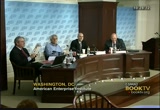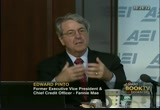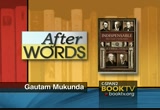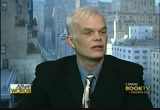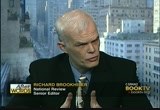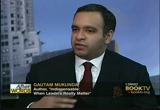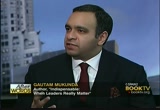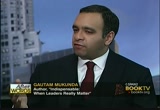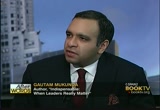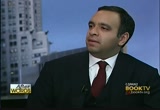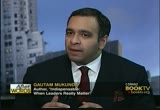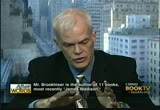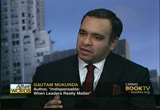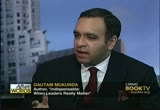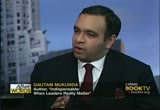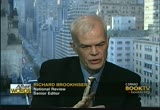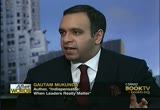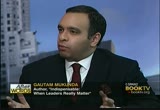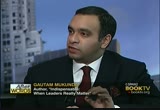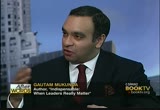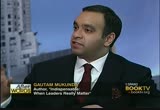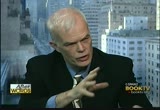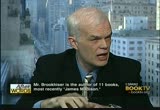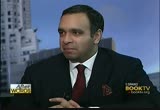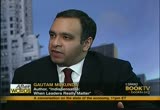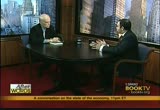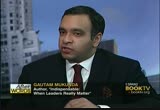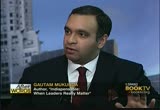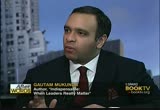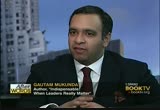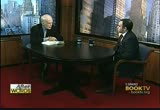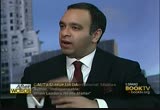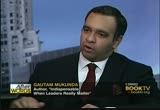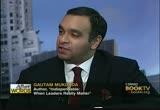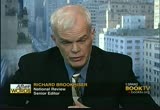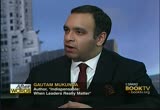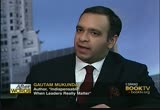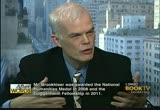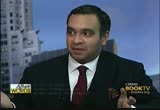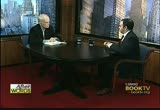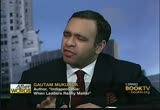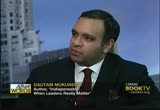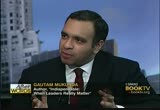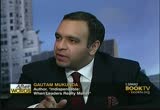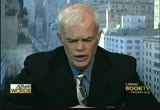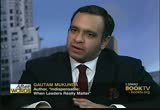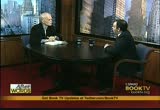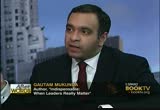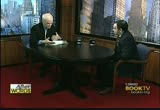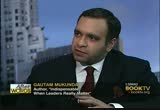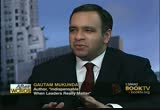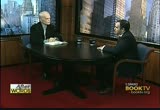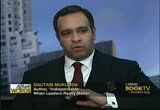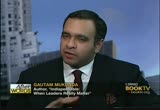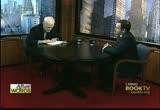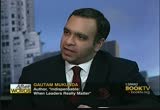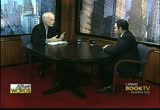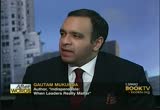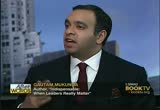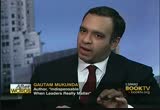tv Book TV After Words CSPAN November 24, 2012 10:00pm-11:00pm EST
10:00 pm
a moment to read the conclusion of mr. johnson's book. >> yes, one minute. >> my ultimate vision is of a housing finance housing, finance, and real estate system flexible to the capability of every individual family we should define a system that shows people what they're able to afford and builds their mom tument toward ownership by giving them savings vehicle, counseling and information. the possibility are endless. if people have ebbing any their home and want to use it. the system should make judgment to how much to let them use. they should allow flexibility based on economic capacity. we should invite families to think about home ownership and prepare for it. chills goes down the spine of the view. what was driving it was more and more debt more and more leverage. that was the only thing fannie and freddie were interested in. the -- businesses were mortgages. they wanted more of them. the bigger house, the higher --
10:01 pm
10:02 pm
review. this week gautam mukunda in his first book, the "indispensible" when leaders really matter. ian at the harvard business professor profiles leaders to determine when leaders matter the most. he also discusses the lessons that can be learned from those who've made the greatest impact on the issues of their day. >> host: this was a delightful book to read. you deal with some very familiar figures but found new things to say about them. you attack them with some new angles. so let's dive in. you have one of your epigraphs is a quote that gets attributed to different people, i gather charles degaulle is most often credited. the graveyards are full of
10:03 pm
indispensable pass. what does that mean? >> guest: appropriately some would say it has a dual meaning. that people call themselves indispensable i think of themselves as indispensable and they can't be because life goes on when they die. all men do. but at the same time, so that's the surface meaning and i think it's the major one. if you wanted to poke the ego of himself and many of his colleagues, the world would end with a tidbit at the same time i think it's a subtle reminder that there are people in history around him almost it seems to hinge, that without them evidence would have been very different. although that is not a very fashionable thing to say i think most historians would agree that their indispensable individuals but that is essentially a matter of context. they were indispensable at that moment in that place in that time. >> host: and you do spend --
10:04 pm
say that it's a controversial notion and of course you have i guess the two teams use you cite are plato and karl marx saying that this is not the case and carlisle saying that it is. tell us how they have locked horns over this? >> guest: so this has to be one of the oldest debates in thinking about history or social science, the debate that predates the idea that there is such a thing as social science but if you go back to plato or marks, the idea that social forces are what explain human outcomes. the people were there. we are just different people and they died of a heart attack and replaced by someone else. what happened is something that really mattered would have ended up the same. in the essay which is in theory about napoleon he barely mentioned napoleon. it's all about the social force
10:05 pm
and so this essentially is to quote samuels from an ip has become history without proper nouns. no people involved. on the other hand carlisle makes the most extreme opposite position and he says history is nothing but the biographies of great men. so it seek easily characters at the great man in history. these are two fundamentally incompatible viewpoints. you can get further apart in your view of the world in these two so the problem that both arguments make sense. the social scientists are scientist or the people following this tradition of not just marks but most social scientists say there are three reasons why leaders don't actually matter that much, that the leader of any organization takes external constraints. you can't set your price at whatever you want. they have internal constraints,
10:06 pm
tradition and culture in all the things that happen inside of the country so you can do whatever you want. maybe most importantly leaders aren't chosen randomly. most leaders of powerful organizations that we care about and organizations that have the ability to reshape history, they are not picked out of a hat. they are picked because the organization is looking for someone with a set of characteristics. >> host: you call that the leadership filtration process. >> guest: that's right. there are very few if any modern organizations that will pick people randomly. countries, companies and even if you look at the sciences which are not in organization and all but they still have a filtration process so yes countries but if we look at the most recent presidential election in the united states, there was something if he went through their public and primaries that people were saying it's not this person. tim pawlenty drops out and then michele bachmann drops out and
10:07 pm
then newt gingrich drops out and eventually you are left with the last person standing. it's not about picking a winner. it's about picking losers. this is not the 1 -- person and finally gets the last person standing. >> host: a process of elimination, which is consistent in whatever organization it is. >> guest: i think it is in the sense that it's a simplified version of reality, that i think you used to build very. theory star simple and you make a more complex but if you take ge. ge is famous for the way it chooses leaders. we always tell her students, ge is the company that works in practice but not in theory. it doesn't seem to do anything as we say it should do but it is profitable and successful. if you had to pick ge's core competency it seems to be it's good at picking leaders and developing managers in training managers and picking the right people.
10:08 pm
ge spends 20 years selecting among all of the people in the organization slowly evaluating them over and over again and so at the end of the day, 20 years, he'd have to work your way up. up. at the end of the day you get five finalists say and the ceo picks one person from those five finalists. when you think of those five finalists, you should think two things about them. the first one is, well they are all probably good at their jobs because they made it all the way to the top at ge and made it all the way to the top of a company that's been successful for 100 years. so they are pretty close to what she is looking for and there's one thing you can be sure ge is looking for is a good manager but the other thing you should believe for the exact same reason is a does not matter which one of them gets picked. obviously matters to them but from the perspective of the ge shareholder there are five people who made their way to the top. how different could they possibly be? they have all passed through
10:09 pm
this 20 year long leader filtration process. >> host: you have a name for leaders that emerge that way. what is that? >> guest: i call those leaders, the idea that there are many people who could become the leader that if you could rerun history a million times he wouldn't get the same person over and over again. you would get random factor so if you think about the presidential election, george w. bush becomes the president at least in part because of the ballot design in florida and the weather in the florida panhandle so i can't think of anything more random than the weather in florida so random facts obviously have an impact. if you run history a million times those random events make different people when, different likelihoods of winning. if you could run that election a million times you get george w. bush 400,000 times and al gore 400,000 times in and john mccain 400,000 times. people who are at the center of the distribution, people who are really likely to win, people who live in thoroughly tilted by the process, from another way i
10:10 pm
describe it is filtered, they have a lot in common with each other. but if you can get power, by bypassing the process and if something happens of the leader filtration process isn't able to thoroughly evaluate you and in the evaluation process recognize you are not what it's looking for forward ever reason, and stops you from getting powered, then those people i call them unfiltered can be on the extreme of the distribution of people who might possibly empower. >> host: so these people are not stopped even though the deck is stacked against them? >> guest: that's exactly it. luck counts or sometimes the deck might not be stacked against them but the evaluation process can be triggered. if you inherit control of your company you were not evaluated, you are inherited. even if you know you were going to do a better job. >> host: we have leadership filtration process. we have model leaders and sometimes we have the extreme leaders.
10:11 pm
now you have two steps of leaders that you look at in great detail. one of them is the president of the united states and the other is the prime minister of great britain since 1832 and the rules have changed. so let's start with the president. why did you pick the presidency as a case to study? >> guest: there were a bunch of reasons. one is importance. it sells books for my first . but even more than that, i think part of our job -- i'm an academic and part of my job is to answer questions that matter that really have an impact on the world so we can describe the president of the united states is the most powerful person in the world. i think that's a fair description. surely if i can do something to contribute to our understanding of how we pick these people and how we can pick them better, that's a great idea. just all by itself i think it's
10:12 pm
an obligation to look at important issues that matter. beyond that the presidency is -- one is just data. the american government historically is so wonderfully transparent and so carefully chronicled that you can get information not just about every president but every person who almost became president and you can get the memos they wrote to each other. i think we should do this and i think we should do this and how they argue about it. i can see, if it wasn't abraham lincoln, who was likely to become president in 1860? i can get an answer to that question and infected in fact it almost certainly would have been seward who is the secretary of state. and then i can go back and look at the memos that lincoln reply to on what seward wanted to do and what lincoln wanted to do and what was actually done so i can get an idea of what happened ends if seward had gotten the job instead of lincoln. so said the measure will put the impact of lincoln was.
10:13 pm
if you are thinking about individual impact i don't big it makes any sense to just say this person was is here and the decision was made. if anybody would have made that same decision it's not about them. japan attacks pearl harbor in december 7, 1941 and december 8, franklin roosevelt declares war on japan and we were deftly going to declare war. >> host: no politician will -- >> guest: that's exactly right. >> host: okay, so you pay particular attention to three presidents, thomas jefferson, abraham lincoln as you are dimensioned and woodrow wilson. so let's do them chronological order. let's start with jefferson. now is he immortal present or in extreme president? >> guest: jefferson is definitely a modal president and the way youth should judge that is how thoroughly where they evaluated before they came to
10:14 pm
power. if someone was very, if everyone had the ability to influence whether or not they would get the job, you knew everything about them, then these people have the ability to recognize, this person is not what we want or this person is what we want so they picked jefferson and if you look at jefferson's career, jefferson had been governor of virginia, ambassador to france, secretary of state, vice president of the united states, member of the continental congress. it's possible that few people in anyone's history had ever been evaluate it or inspected as closely as thomas jefferson was before he came president. people were looking at him and saying this is the guy we want. this is the person a should be president. >> host: his opponent said this is the guy we don't want in a close election. >> guest: it was a close election although it was a strange election. >> host: it was a very strange election but it was very hard fought.
10:15 pm
but i guess what you are really saying is both the supporters and the opponents knew who they were talking about. >> guest: partly that. especially the parties become ideologically homogenous as they are now into a certain extent they were then. any democrat will be different from any federalist so if you are managing individual leader impact you shouldn't measure the democratic against the -- you should measure the democrat against the democrat who would have been there if the democratic, the first one had not had the job. >> host: if jefferson were run over and killed, another party contested that election. >> guest: the other member the party was james madison so we look at jefferson. what would madison have done and jefferson shoes because madison is likely alternative and medicine like jefferson have been thoroughly filtered and was likely to be a modal candidate.
10:16 pm
if the dice and roll differently maybe john adams gets the presidency and holds onto the presidency. he could probably just take -- and see what he would have done but the important thing jefferson versus madison, what happens? jefferson is thoroughly evaluated and the election in 1806 citing, one of the most exciting elections in u.s. history because jefferson -- from aaron burr. the idea of aaron burr as president, random think matters. if aaron burr becomes president it's hard to imagine -- but he doesn't and he doesn't because in large part people realize that aaron burris not summoned they want anywhere near the white house at jefferson becomes president and then jefferson, the question is how much does it matter? if you look at the jefferson administration historians are
10:17 pm
overwhelmingly, the most important event of the jefferson administration was the louisiana purchase. not surprising. if you double the size of the country peacefully and at almost no cost it's an enormous achievement for any president. any president would want that on their resume. so is jefferson a high-impact president? that is what i want to know. if jefferson is not there just louisiana purchase happen anyway? what you see is jefferson sent an emissary to france to buy the louisiana territory from france except he sent an emissary to buy bye-bye the city of new orleans from france. the louisiana territory as a whole was not mentioned by anyone in the united states is even a possibility. the emissary travel across the atlantic and lands in france in search traveling towards paris and before he even arrives in paris, the american ambassador who was already there -- robert
10:18 pm
livingston's approach by talleyrand who is napoleon's foreign ministry and talleyrand comes to livingston says essentially how would you like to buy the entire territory of louisiana? livingston, he's not exactly surprising that livingston said yes, let's do this. they complete the negotiations negotiations -- i'm sorry, james monroe. who would become madison secretary of state and with them become madison's successor as president? we have your in the room a bunch of people who were almost, who would be president or almost president so monroe completes the negotiations. they are not typical. the french really want to sell. sell. they have bigger problems with britain and they want the cash. >> host: louisiana they have decided -- >> guest: one way or another, it's too far away and he says amazingly it was for sidekick is in this reputation for genius of
10:19 pm
mixed ethical quality. a century from now it might be so powerful that no one in europe can stand up to it but a century now from now's not my problem. seven news -- they take the news of the purchase back in the news arrives in boston so boston is the federalist territory. austin is the opposition that would surely want to deprive jefferson of any such tyamck and the way they signaled their opposition to the purchases they set off a fireworks display in celebration. this was not a controversial thing in american politics. american politicians were enthusiastic about this. the senate's starts to debate whether the ratification of the trade and treaty and the only obstacle arises is that jefferson himself gives strict instructions of the abuse of the power of government led him to play the federal government does not have the power to acquire
10:20 pm
territory. he starts to him and hans is needed constitutional amendment to give the government this power. napoleon who had overthrown -- >> host: and institutionalist. >> guest: not likely to be impressed and he starts making arguments. i will just revoke the treaty. it's not even ratified yet. madison comes to jefferson -- >> host: who is the secretary of state. >> guest: madison comes to jefferson and says he you can't do this any more. this is too big an opportunity to let your strict view of the federal government holds sway and jefferson agrees. he back-stabber and they make the purchase. jefferson displays a great deal of skill. he chose the right person. >> host: he chose monroe? >> guest: he gets at the senate's successfully so he displays skill and flexibility. but think about --
10:21 pm
>> host: flexibility because he is willing to overwrite his own people? >> guest: in the end he's willing to say this is too big of an opportunity. we have to get this plan and we do. skill and flexibility are things that on the whole we like in a president but you shouldn't be surprised that someone with jefferson's record has skill and flexibility. think about all the things he did. he didn't have those two things, the process in that long or it would have seen it and stop them from getting power. the question isn't again being a low-impact leader is not a bad thing. the easiest way for a leader to have an impact -- there are so many more ways to fail than ever to succeed so most high-impact leaders are bad. >> host: you also make the point that not only was jefferson seeing eye-to-eye with livingston and paris and madison's secretary of state but major federalist, his enemies,
10:22 pm
also approved this move. not all of them but the major ones. >> guest: in fact john adams was on her, not publicly but privately saying he was in favor of the purchase. he broke party ranks to vote in favor of the purchase on several critical senate votes. is hard to imagine doing that without the approval of the top so as we see in modern politics a major of major incentive from the federalist would deny jefferson such a triumph. it's easy to imagine. >> host: but they like it anyway. so this is an example of jefferson as a modal leader, but everybody else who might have been in his shoes you are saying would have done the same thing. presented with this golden opportunity they all would have grabbed its? >> guest: that's right. anyone who would not have grabbed it would not be running for president. >> host: let's go to the second president, you party talk to him, abraham lincoln.
10:23 pm
modal or extreme? >> guest: extremely extreme. lincoln is as unfiltered as anyone in american history. the story is such excitement and random offense that is almost impossible to capture. we could go on for hours on just this topic but his record in american politics is extraordinarily brief. he is a one term in congress in which he is so unpopular he does not run for re-election and he's been in the state legislature for a while but it doesn't tell you anything about your ability to be president. he hadn't been in the state legislature for a while before he runs in 1850. he runs for the senate and is defeated both times. he's a national celebrity which at the end of the day you lost and his speech in new york -- i don't know whether he won up at the end of the day the purpose of the debate was to win the election and he did not win the election. the speech he gave in new york, the way i like to think about it is we all remember barack obama speech in 2004.
10:24 pm
this dazzling rhetorical masterpiece that instantly makes him a national figure and four years later without that speech is not a plausible candidate. lincoln gives a dazzling speech in new york at the cooper union. it's a beautiful testament to the quality of lincoln's research he does. it's it is well worthy of praise but when he ran for the senate when barack obama gave a speech in 2004 he was running for the senate in illinois and he one. abraham lincoln ran for the senate in illinois and he lost. if you want to think about abraham lincoln in 1860 think about barack obama running for the presidency in 2008. if he had lost the illinois senate election, none of the iguana, that is the level of national security we are talking about here. the republican national committee votes to put the republican convention in chicago so in illinois lincoln -- lincoln is from illinois, the
10:25 pm
land of lincoln. a huge hometown advantage but the reason the committee puts it in chicago by one fod by the way. it could have been in missouri, was because no significant republican candidates were from illinois so was mutual territory. once -- >> host: so they warrant worried about a home-court advantage if he was not a player. >> guest: he was not a player. there were biographies of 10 major candidates. lincoln was not even on the list. >> host: tell us about the two-front runners, the two republican front-runners. >> guest: william henry seward who would become lincoln's secretary of state and salmon p. chase, governor of ohio. >> host: seward is a senator? >> guest: seward is a two-term senator from new york and a two-term governor. >> host: new york is the biggest day.
10:26 pm
>> guest: big is the most powerful state. this is only the second presidential election he has ever participated in. seward is the dominant figure in the republican party. he is more significant than any two others in the party combined. chase, another alternative is perhaps the man chiefly responsible for the public powers party in ohio and much of the midwest. >> host: also a big stay. >> guest: also a big state even in those days and perhaps america's, one of america's most famous anti-slavery advocates on the national scene. he didn't start out that way but at this point he was. seward also not that radical was generally perceived to be that way because the series of speeches he was giving that were viewed as inflammatory. lincoln because he did not have a national record could portray himself as the least radical.
10:27 pm
in those days it meant the least antislavery republican who then was up for the race. they go in, and seward just doesn't have the advantage of being the dominant republican and being the governor and senator from new york, seward also has -- >> host: it is a great name. >> guest: it is -- >> host: it's like tom wolfe. >> guest: he portrays weak smock of alien nature i guess. he is the finest political operative in the mid-19th century. he goes to this convention. he has essentially infinite financial resources when deals under the table could involve cash as well as anything else that could happen. >> host: that doesn't happen now. >> guest: of course not. he goes there and back seward was not the republican nominee in 1856 because we have come a long time ally told him, was
10:28 pm
smart enough to save there is no way are winning. you don't want the leader of a losing cause. let's wait for years and we will certainly win. he read the politics exactly right. lincoln's campaign manager, david davis, to put this in perspective davis had never been to a republican national committee so you have that veteran the best in the business against the guy who's never been to a convention and then davis goes and. the one advantage that seward and we'd don't know about is he knows that we will be a player and he knows he's from his hometown and he knows that chase will count the ohio delegates and the delegates from ohio with support chase on the floor the convention on the first ballot only. in fact several other states will support their candidates on the first ballot that the first ballot wants and what this means is seward probably can get a majority of the delegates on the first ballot. there will be backroom dealing
10:29 pm
and horsetrading and negotiating. davis goes there -- >> host: let's wrap this up because we are we are coming to a break. set the stage and then we will come back and find out who wins. >> guest: if you want to think how random american politics gets gives david davis realizes feeding arrangement in chicago are going to play a crucial role in determining the nominee for the republicans and the next president of the united states. >> host: we will be back after a brief break.
10:30 pm
>> host: we have left her cells at the chicago convention in 1860 and we are talking about weed as an unfiltered leader, someone coming out of left field and you set the scene of his obscurity, his pre-conventional obscurity, but he has some advantages, some home-court advantages. tell us what effect the seating had as the convention plays out. >> guest: lincoln's team is able to recruit lincoln supporters and they are testing them on how other forces are. they bring bringing them into chicago on discounted tickets. they printed fake tickets for the convention and stack the hall to the rafters with these lincoln supporters. every time lincoln's name is mentioned, the supporter start yelling and screaming and shouting their support. so much so that the windows of the hall actually shaken
10:31 pm
response. so davis, lincoln's campaign manager goes to the seating arrangement guy and he says i want the new york delegation where weed is seated and he surrounded on all sides by other strong seward states. so davis knows that it will be such a zoo that no one will be able to get themselves think much less talk to one another. so if we dislike is when this when the negotiation has to start, he will be physically blocked off from getting the state that he needs to swing to seward support. that's right, the swing states that could go to anybody. the most important is pennsylvania. pennsylvania -- >> host: also a big state. >> guest: also a big state that has the ability to put seward over the top. pennsylvania's governor simon cameron controls the pennsylvania delegates.
10:32 pm
eventually he becomes lincoln's first secretary of war. simon cameron is corrupt and another -- said cameron would steal anything but a red-hot stove. when cameron asked for a an apology apologize and said i'm sorry he would also steal the stove. [laughter] so cameron is open to a deal. lincoln sends a message to davis by telegram and those days candidates do not attend the conventions. he is back in springfield and seward is in albany new york. lincoln sends a telegram and the telegram says make no deal that is binding. he does not want to corrupt bargain. davis gets a message and says essentially lincoln is not here. we will do what we need to do and he will baccas at baccas at the end of the day. davis goes to cameron and he andy says swing to lincoln and i guarantee you we will get a major cabinet position.
10:33 pm
cameron says okay and makes the deal and lincoln capture the nomination. >> host: in effect, this is the election, right? >> guest: at this point the democratic party has split. neither has chosen a candidate. it's clear that the northern democrats will choose their old adversary and it doesn't really matter. the split in the party means the republicans will clearly win the election so the republicans know they are picking a president at the moment of the greatest crisis in american history and yet, they choose a one term congressman over a two-term governor and senator with an international reputation. >> host: now you say there are many possible likely consequences to choose such an extreme person in a situation like that and they are not necessarily all good. among them is personal, we might
10:34 pm
even say mental problems, the possibility of that. tell us about how this played out. >> guest: so if you are going to pick a president for a crisis, take the civil war. one thing you don't want is someone with psychological problems but lincoln, think the evidence is overwhelming suffers from lifelong chronic depression at least twice in his earlier life he had been put on suicide watch by a friend who had removed all sharp objects from his room and stayed with him 24 hours a day. when you think about what it took to be put on suicide watch in the early 19th century, he gives you a sense of how debilitating his depression actually was. it's quite probable during the time in his presidency he was similarly struck by a major depressive crisis that almost incapacitated him. this depression was a problem in some sense that lincoln was able to triumph over and continue on
10:35 pm
without modern medical therapies. in some ways it may have been an advantage. >> host: how so? >> guest: psychologists have a phrase for people who are able to accurately assess their life prospects and chances for success in an endeavor and that is for the clinically depressed. we are all naturally optimists and we all overestimate our chances. this idea of depressive realism, the people who are just mildly depressed, nonsense so severe that there can pact to come our actually better able to calculate your odds of success than healthy people and may have been a strength in his ability over the course of the war to understand when endeavors were worth taking a chance on. >> host: does that also help -- >> guest: lincoln sympathy is so deep and profound that i don't think any one source, you can't attribute to any one source. this is a man who went he was a
10:36 pm
child was noted by other children -- to the west in those days was a rough-and-tumble place, someone unable to be an animal -- who stands up for the boley going to continue and routine basis so i suspect that depression may have played a role but empathy is an extra found in his character. it's almost foundational in our understanding of him. >> host: lincoln wins the election in 1860 and as we all know from reading clarence goodman's wonderful book, team of rivals, he picks his main rival, he picks all of them for his cabinet but the main rival seward gets the most important job as secretary of state. the modal leaders that we were just talking about, jefferson, he was modal because he was like anyone else in issues. everyone would have ran for
10:37 pm
louisiana. him everyone would have made that choice. lincoln is extreme. what does he do that his peers would not have? >> guest: the lincoln administration is filled with different examples of things that only linking could have done. at the end of the day, lincoln is the genius. he's a genius on multiple levels and multiple fields. the country is lucky if they get something once and we got someone at the moment needed that the bus best way to look at the very first decision that makes this president, because then we don't see this rippling consequences for small differences throughout the administration. for my purposes lincoln's choice of seward as secretary of state is the best possible choice because it's the perfect natural experiment. i know what lincoln did and i can see with seward wanted to do because seward is telling
10:38 pm
lincoln what he wants to do. he gets all the information lincoln does. he is in many ways still the dominant republican in the country. in those days even chicago was not a major city. it was a big city but it didn't have the prominence of new york or philadelphia. lincoln is from springfield, and so in seward's view he has a hick from nowhere in the white house was completely incapable of doing the job, the job that seward should have had in seward is completely free at telling lincoln that you should do what i tell you to do. so the crisis for the president starts to revolve around ft. sumpter so ft. sumpter's besieged by members of the south carolina militia and held by federal troops and essentially the crisis comes down to what shall we do about its? >> host: sc seceded? >> guest: that's right so seward is one of the last federal territories, though only
10:39 pm
one that's important. seward's position is he doesn't think they are serious about secession. there've been multiple secession crises in the past. they have the secessionist fever. if we just let them go, six months from now they will come back. not a problem here. seward says let's just let them have sumpter. pull the troops and everything will be fine. then he said, you know, everything is not fine. we should start a war with spain or france. it will rally the flag and everyone will beat upon the europeans and we will all be unified again. sewer did not say this idly. seward told the ambassadors that this was his attend -- and tension on multiple occasions. the question is, what is lincoln wanted to? lincoln has a problem. the north is not unified behind a war effort.
10:40 pm
may be only one third of northerners want to fight a war to keep the south from the union. about one third are enthusiastic about secession. they are fine, let's go get rid of the south. we don't have to deal with them anymore and another third just don't care. we don't want them to leave but we don't want to fight for it. this will be a bad war. and so, lincoln does something very clever. some people in the cat cab that want to send an armed expedition to the ft. sumpter and some of them want to sneak these troops in to reinforce the ford. lincoln does not do any of those things. what lincoln does is he announces publicly that if you spend and -- sent an expedition, no food, no weapons, no ammunition. by doing this he is forcing the decision to the hands of south carolina radicals.
10:41 pm
they left this first expedition they won't have a second expedition. if they don't let it through their firing on unarmed convoy, so they fire and they start a war. but, when somebody fires on your flag, all these concerns about let them go, falls by the wayside. think about the united states after september 11 or pearl harbor. the entire north is instantly unified behind lincoln and their crusade to reunify the country. that unity will last but it gives lincoln a year, maybe two when he can operate almost undefeated and launch a war effort, without that unity you can imagine how the north winds the civil war. without that unity i'm not sure there even is this civil war and i'm pretty sure the south goes on its own. if seward is the president of the united states as he should have been, let's be honest.
10:42 pm
if you you are picking a man to be president of the united states -- [inaudible] even as an oddsmaker, on merit, on achievement you wanted to term governor and two-term senator or the guy that no one has ever heard of? i think you want the first one. if seward is the presidents than these states are not united any more. but it's abraham lincoln who is willing to push into the fire. >> host: abraham lincoln the odd man out made the decision which left us with the result that we have. and seward recognize this. >> guest: seward actually says to lincoln what most -- might be the most extraordinary dialogue received latin american president. he essentially says look, you're not doing anything. you should let me be the shadow president. you have control of me and lincoln says you know, many things can be done by the something must be done i must do
10:43 pm
it. that was the phrase. lincoln is a genius of lots of things. one of the things he is incredibly gifted at is what i call the personnel management. he no seward is a patriot so instead of leaving this is a feud that could shatter the cabinet and loses incredibly skilled politician he is able to conciliate seward and within a few months seward says to his wife, and the credit only glad that the country is abraham lincoln to lead us through this crisis and is quoted, he is the best of us. again without that almost supernatural ability to work with almost anybody, not just with seward but with stanton who would replace cameron as secretary of defense in various generals, it's difficult. this was not a unified society. this was one i had to be managed constantly and a typical
10:44 pm
endeavor. >> host: okay, so let's look at your third president who was also as extreme as woodrow wilson. does this turn out exactly is abraham lincoln? >> guest: not even close. wilson again is as unfiltered as you can possibly get. wilson impact is the least experienced in terms of time in politics, the least experienced person ever elected president. at the time he becomes president, his total political experience, all of it, is about 1.5 years so he is not spending a day in the legislature. he gets elected president. >> host: he has written a lot about politics. >> guest: like me has a political scientist. i suppose that should make the more favorably disposed toward him but academic research on politics is not the same thing as doing politics and not the same thing as the experience.
10:45 pm
in some ways we value experience too much. experiences about moving you up the learning curve. the other thing that time in politics gets is not just what he gives you the candidate, but not just experience but a valuation. gets other it gets other people in the arena the chance to look at you when you have power and when you are under pressure and when those cameras are off to see what you're really like when you're not trying to impress the public. we know that power has an effect on this and they're usually chronological effects. if you want to know what someone is like when they have power, you have to give it to them. you have to deserve them when they have power, not for a day or week or a month but for years to see what they are really like. no one had the chance to do this with woodrow wilson. >> host: he is president of princeton. >> guest: people at princeton
10:46 pm
found this not to be a very happy experience. many of his reforms were very viable but wilson for example created the federal reserve system. but, over time at princeton his presidency essentially collapsed because of his constant rigidity and refusal to negotiate with anyone who disagreed with him even over small things. the problem is that the information you need when you are judging if someone will be a good leader, it worked quite the opposite. what are they like in the backroom and what are they like under pressure? that kind of information does not flow well across organizational boundaries. you gossip within politics, but how many politicians know very much about what -- what is she really like? i am an academic. i have never met her. i know about the president of
10:47 pm
harvard but i don't know anything about the present of -- the wilson princeton experience and evaluation at princeton now is the historians looking back we can say that tells us a lot about what will happen in his presidency but this time they did have access to that information. and you would not expected to get out. >> host: you have a great quote from -- where is that? one of his princeton peers. when opposed or annoyed he grew arrogant answer cast it. he occasionally spoke to me in a way that i would not have tolerated from anyone else. it doesn't sound very lincoln asked. >> guest: all right, so he manages to be elected president in 1912 and another famously complex election. this time the republican party has split, almost a mirror image
10:48 pm
of lincoln. lincoln wins because the democrats were split. so tell us about the episode in his administration that you must focus on? >> guest: i focus on the treaty oversight particularly the senate struggle to whether not the united states should ratify the treaty oversight. the second half of the second term. this is the treaty that and the war. the treaty is designed to create a post-war settlement. some sort of a world that will be more stable that will never leave such a horrible conflagration again and of course we know they failed to cope with the treaty does to try to do this is create a league of nations and so this league of nations is wilson's brainchild. none of the other major negotiators at the versailles peace conference had any interest but wilson did. the league is not purely a
10:49 pm
product of wilson. to give you an example of two other people who supported the league, theodore roosevelt and william howard taft, wilson's opponents in the presidential election. so it leak was well within the mainstream of american foreign-policy. they believed in it but wilson is the negotiator. he gives part of the treaty and then he comes back to united states and the senate has to ratify it. their 96 centers at the time in 80 of them have said that they want the united states to ratify the treaty and join the league of nations under some conditions. 80 is well more than enough to make the ratification. >> host: they need two-thirds. >> guest: two-thirds, yes. ratification is not hard. you need 64 or 65. the problem is the senate republicans led by henry cabot lodge who wilson had known for many decades, they don't want to
10:50 pm
give wilson a try and. some of them are opposed to joining the treaty and they have reservations about the sovereignty. many of them are willing to join the treaty with a condition. these reservations are not huge. the british for example will eventually say they have no problem with the treaty. it's not an obstacle for them. >> host: they are not deal breakers. >> guest: they shouldn't be deal breakers. very few people view them as deal breakers. henry cabot lodge knows wilson and lodge says wilson, you know he might have reservations on the principle that he will never accept reservations that i have an wilson in a private meeting is told we can get the reservation. wilson says, i will never accept long-range reservations. anyone who opposes me, i will crush.
10:51 pm
in private but he cannot crush lodge. so lodge as the reservationist of the treaty -- >> host: lodge is the republican. >> guest: lodge is the -- it's pretty closely split. i believe there is a democratic majority at this point but not enough to ratify. at this point the key is the 65. the key is the 65. that is what he needs and you have to have republicans. you have to have lodge. he has enough power in the republican side. he said i will vote yes on the reservation. wilson, all he has to do to get the treaty passed is to agree. >> host: do you think lodge would have? >> guest: lodge on multiple occasions voted for the treaty when it went up with reservations so what happened
10:52 pm
is, wilson goes out on the speaking tour the country to persuade the country, sort of a public storm that would overwhelm republican opposition and while he is on a speaking tour he is incapacitated. he was foreign to the tour by the time the stroke hit him. the two are was not presenting any public pressure on lodge at all. they bring the treaty up with no reservation. all the democrats vote yes on all the republicans vote no and it does pass. lodge votes yes, big chunk of republicans vote yes and a big chunk of the democrats vote yes and wilson since two members of the cabinet onto the floor of the senate to personally and hold senators and personally lobby them to say the leader of your party is ordering you to pose the treaty of preservation and it wins by a handful of votes, four or five boats.
10:53 pm
when anyone else as president, the treaty passes. it will some -- if wilson had died of a stroke, the treaty would pass but wilson stopped his own creation. and this is just remarkable. jefferson was flexible. politicians are flexible. that is the defining characteristic of a politician. wilson is rigid at a level that goes beyond normal rigidity. its pathological rigidity so rigidity that cripples him throughout his entire life. if he had in politics for 10 years before he became president everyone would have known he was like that and he would never have gotten the presidency. all the characters you want in a president, unable to accept a victory just because your opponents name is partially attached to it is surely not one you want. >> host: you have a wonderful quote from senator from connecticut.
10:54 pm
we can always depend on mr. wilson. he never has failed on us. >> guest: that's right. only wilson could have stopped the treaty that treaty and only wilson did. >> host: of course there was no two-term limit in that day so if wilson, wilson having a stroke would mean he could not run a third time but you know, running history a million times if wilson had not have the stroke he could potential he had gotten a nomination for a third time and fought an election on this issue, right? perhaps he is thinking of doing that. >> guest: somewhat delusionally he was in fact hoping he would get a third nomination but this was inconceivable even after the stroke. this was impossible and he would never consider it so we did want to an election in 1920. but i mean, even if he had won it, the breakup because of the
10:55 pm
two year cycle, because of the two year stagger so six year term with the stagger of two terms he could not have defeated enough republican senators to swing the ratification until i believe 1924. it would have happened in 1920 or 1922 he would have won three elections on the one issue the treaty. it's inconceivable he could've done this. people would have moved on by then. >> host: now, so we have presidential case studies. i urge people to buy this book to see about neville chamberlain and churchill as british prime ministers but you also talk about business and english admiral but when you are summing up, you say that the extremes, and we have talked about to extreme presidents, one a very good choice and we were lucky
10:56 pm
that he got through the process, and in your view as very dead choice, woodrow wilson. but you say it's hard for the nation to know whether you were looking at it that extreme or a bad extreme and then you have this wonderful line. this looks depressing. >> guest: indeed it does. >> host: what advice do you give voters who participate in the organization of american politics, or members of companies who are looking for leaders? should they ever look at extremes? when should they look at extremes and when should they run that risk wax. >> guest: i'm not opposed to gambling but i think you should always gamble with your eyes open. you should know you're taking a gamble and taking a gamble as was said before there'll more ways to fail than to succeed. most extremes fail. joran station is good, they're not what you're looking for and you want to believe you are looking for the right people.
10:57 pm
one thing would be how desperate are you? are you just on the point of bankruptcy? you can't go more than bankrupt so an extreme leader, a steve jobs for example might be the one person you can save your company and then you should gamble. if you're a voter and you think the united states is in crisis and the system has failed and the people who are choosing normally just cannot get about in 1860 clearly had. you want him. the system is a working anymore, it's time to break and you can't get a worse outcome. been total failure and bankruptcy and civil war. the second, think there things you can do. you can reshape the job around that. corporate leaders for example you should simply never have an outside ceo who is the chairman of the board of directors. there is no circumstance where that is a good idea. >> host: by definition could that be an extreme? >> guest: the information does not flow from one organization
10:58 pm
to another. unfiltered leaders are likely to be extreme. some of them will be because some people are normal but the odds go up a lot when you bring in an unfiltered person. i think the hardest one is, so extreme leaders succeed when they do what no one else would do and what everyone else tells them not to do and it's the right idea. and they fail when they do what no one else would do when everyone tells them not to do it and it's the wrong guy. the successful extreme leaders are the ones who are somehow able to stick to their guns when they are right and change course when they are wrong. but were everyone else always thinks they are wrong, if if you can't use right to everyone else is wrong. that is not the barometer. if you look at lincoln and one of their leader i profile in the book, a great man, with differentiated them from all the people i looked at who are successful but i suspect lucky and the fact that they were
10:59 pm
right on the key calls but in a different situation they would have been wrong, is not just that they have to this sort of supreme self-confidence to resist the advice and to go ahead when everyone is telling them they are wrong, they also have extraordinary intellectual ability required to keep listening to people even as they pushed ahead, to acknowledge the possibility that they were wrong in a profound sense, not just a surface sense but to say if i'm wrong what does that mean? how do i change course if i'm wrong? when they were wrong because no one is right all the time, they could change course as lincoln did many times during the civil war. so it's this combination. >> host: that is a rare combination. we are wrapping it up here, so quickly, we just had a presidential election. i guess barack obama was
106 Views
IN COLLECTIONS
CSPAN2 Television Archive
Television Archive  Television Archive News Search Service
Television Archive News Search Service 
Uploaded by TV Archive on

 Live Music Archive
Live Music Archive Librivox Free Audio
Librivox Free Audio Metropolitan Museum
Metropolitan Museum Cleveland Museum of Art
Cleveland Museum of Art Internet Arcade
Internet Arcade Console Living Room
Console Living Room Books to Borrow
Books to Borrow Open Library
Open Library TV News
TV News Understanding 9/11
Understanding 9/11